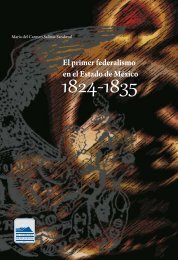Create successful ePaper yourself
Turn your PDF publications into a flip-book with our unique Google optimized e-Paper software.
ERIC VAN YOUNG, THE SPHYNX OF SAN COSME: A HISTORIAN’S THOUGHTS ON WRITING A BIOGRAPHY<br />
elitist attitude and life-style. Oscar Wilde, for example,<br />
is said to have lived his life as though it<br />
were itself a work of art: his predilections, selfpresentation,<br />
and philosophy, not to mention<br />
his works (for example, his famous essay “The<br />
Critic as Artist: With Some Remarks on the Importance<br />
of Doing Nothing” [1891]) all point in<br />
this direction. 12 The Marxian framework has produced<br />
some major works in biography, as for<br />
example Isaac Deutscher’s (1907-1967) three<br />
volumes (1954-1963) on the life of Leon Trotsky.<br />
There is information of a personal nature about<br />
its subject in this sprawling work, but the primary<br />
driver of the narrative is the life of a great<br />
political figure within a specifically communist<br />
revolutionary context—a work about a Marxist<br />
by a Marxist. I find this to be reductionistic to an<br />
extreme degree since in this framework individual<br />
thought and action are in large measure (not<br />
entirely, to be sure) reduced to social forces determined<br />
by the relations of production, or in this<br />
case at a remove in a massive political upheaval<br />
ostensibly fueled by the logical outcome of conflicting<br />
forces rooted in those relations. My good<br />
friend, the late Argentine economic historian<br />
Juan Carlos Garavaglia, who taught in Mexico<br />
for a number of years, left me with a number of<br />
fond memories, among which was the aphoristic<br />
injunction to remember that “people have psychologies<br />
as well as sociologies”.<br />
This brings me to the question of the psychobiographical<br />
framework for biography, to which<br />
I devote somewhat more space here since I find<br />
it the most interesting, albeit the most risky, and<br />
it is closest to my own preoccupations as a biographer.<br />
The psychobiographical framework<br />
is less of a straitjacket in writing a life than the<br />
Marxian approach, for example, since it is specifically<br />
geared toward understanding individuals,<br />
the objective of biographical writing, rather than<br />
laying out broad historical generalizations as instantiated<br />
in the life of a single person. But in its<br />
many possible degrees of interpretive freedom<br />
also lie a great deal of risk, that of over-interpretation<br />
in the service of a decidedly slippery<br />
psychological model. As an explicitly identified<br />
12 See the magnificent biography by the late Richard Ellman<br />
(1918-1987), Oscar Wilde (Ellman, 1987), posthumously<br />
awarded the Pulitzer Prize for biography in 1989. Ellman, also<br />
the author of a monumental biography of James Joyce, does<br />
not explicitly write that Wilde lived his life as a work of art,<br />
but it is a fair conclusion to judge from what he presents.<br />
sub-genre of biography (which may itself, as<br />
Henry James asserted, be viewed as a sub-genre<br />
of history) this dates from the works of Sigmund<br />
Freud and obviously employs psychoanalytic<br />
concepts (although other psychological models<br />
have been applied) to plumb the depths of historical<br />
actors’ minds and motivations. It is a tool<br />
that can have either a blunt or finely honed edge;<br />
that is to say, the conditions of its applicability<br />
and the subtlety of its application, and therefore<br />
the degree of its credibility, have varied widely.<br />
It has always seemed to me a very promising<br />
approach that has produced very mixed results,<br />
demonstrating its “idiosyncratic nature” (Kushner,<br />
1993:20). 13 There are a number of problems<br />
with this framework, of which I mention only<br />
three here. The first is the proposition that psychoanalytic<br />
models of psychological structure<br />
and function are transhistorical and transcultural—that<br />
they apply equally well to all cultures<br />
at all times in history, a problematic assumption.<br />
The second problem is that a knowledge paradigm<br />
developed and mostly applied in a clinical<br />
setting in which a dialogic process between patient<br />
and clinician is absolutely essential to the<br />
efficacy of treatment, is often applied to a dead<br />
subject who cannot answer back, elucidate, or<br />
progress emotionally; when it’s a live subject<br />
the published analysis becomes a fait accompli<br />
of which discussion may produce more heat<br />
than light. This is not exactly a static situation,<br />
since the biographer, try to avoid it though he<br />
might, will almost certainly paste some emotional<br />
projections of his own onto the subject of<br />
the study. 14 But the biographee cannot object or<br />
13 While principally a critique of Erik Erikson’s psychobiographical<br />
study of Martin Luther, this article also contains<br />
useful comments in criticism of psychohistory more broadly.<br />
14 For example, my own conclusion that Lucas Alamán’s<br />
character may have tended toward the melancholy might<br />
well be a projection of my own personality onto his, although<br />
I have tried to think my way through this to find plausible<br />
evidence for it in the historical sources. The best counterweight<br />
to this sort of thing, obviously, is for the biographer<br />
to make his own emotional and intellectual characteristics<br />
as explicit to himself as possible (“possible” being the key<br />
word here). Related to this is the question of a positive or<br />
negative emotional attachment of biographer to biographee.<br />
Elizabeth Young-Bruehl (1946-2011), a psychoanalyst and the<br />
biographer of Hannah Arendt and Anna Freud, once referred<br />
to this as the “ich” (as in “icky”) factor—whether or not one<br />
likes the person one is writing about, and beyond this if they<br />
are even likable in any normal sense. The classic limiting case<br />
here is that of Adolf Hitler’s biographers, among Anglophone<br />
writers Alan Bullock and Ian Kershaw, for example, where<br />
predictable revulsion is overridden by the inherent historical<br />
importance of the subject.<br />
8



![bicentenario_1[V2]](https://img.yumpu.com/68677971/1/167x260/bicentenario-1v2.jpg?quality=85)









![El_primer_federalismoEM[final]_compressed (2)](https://img.yumpu.com/68483279/1/178x260/el-primer-federalismoemfinal-compressed-2.jpg?quality=85)


